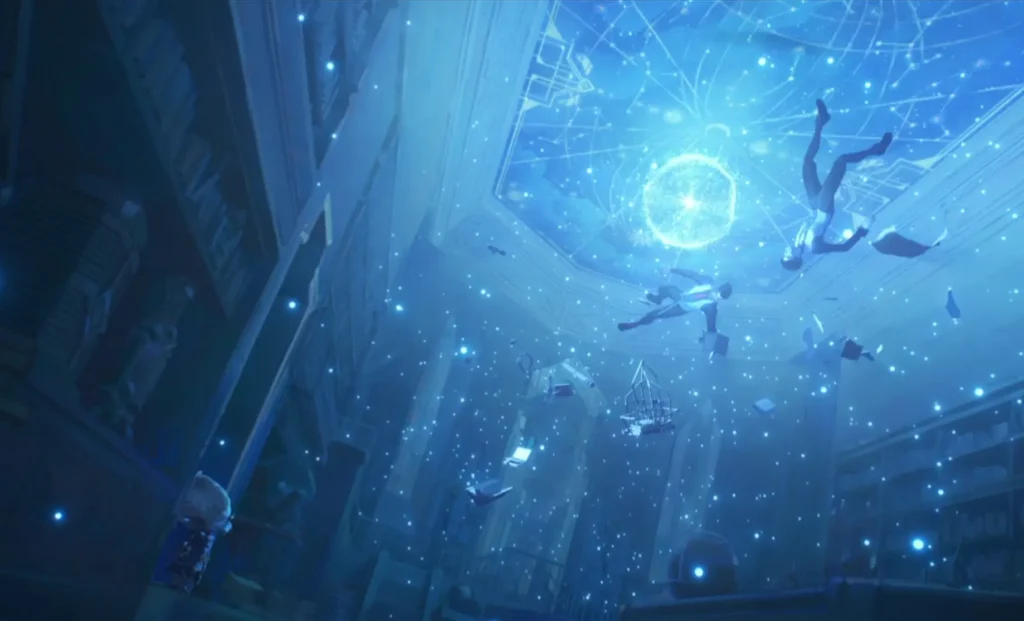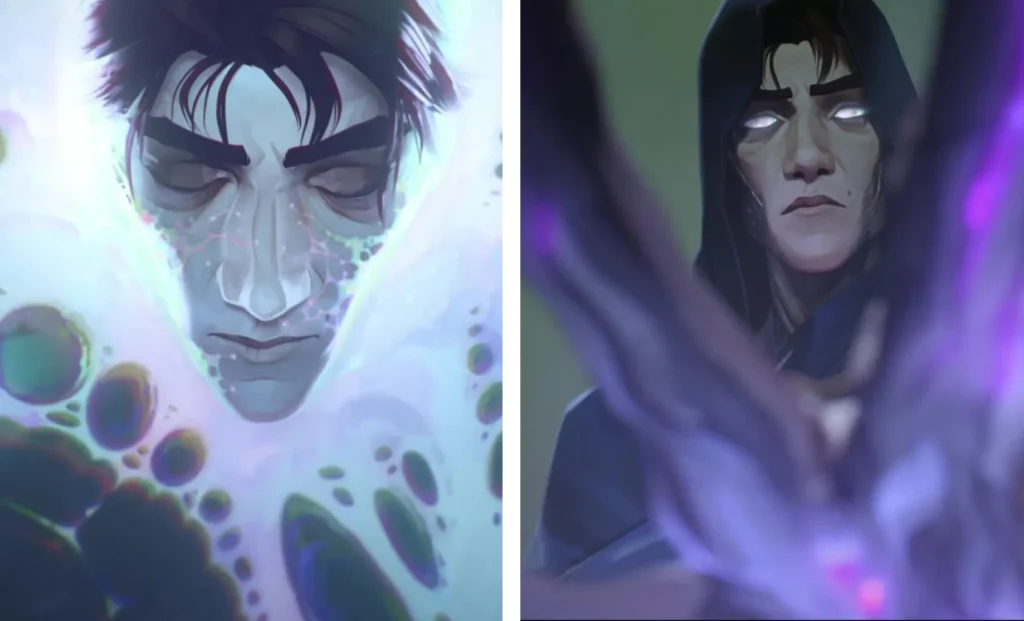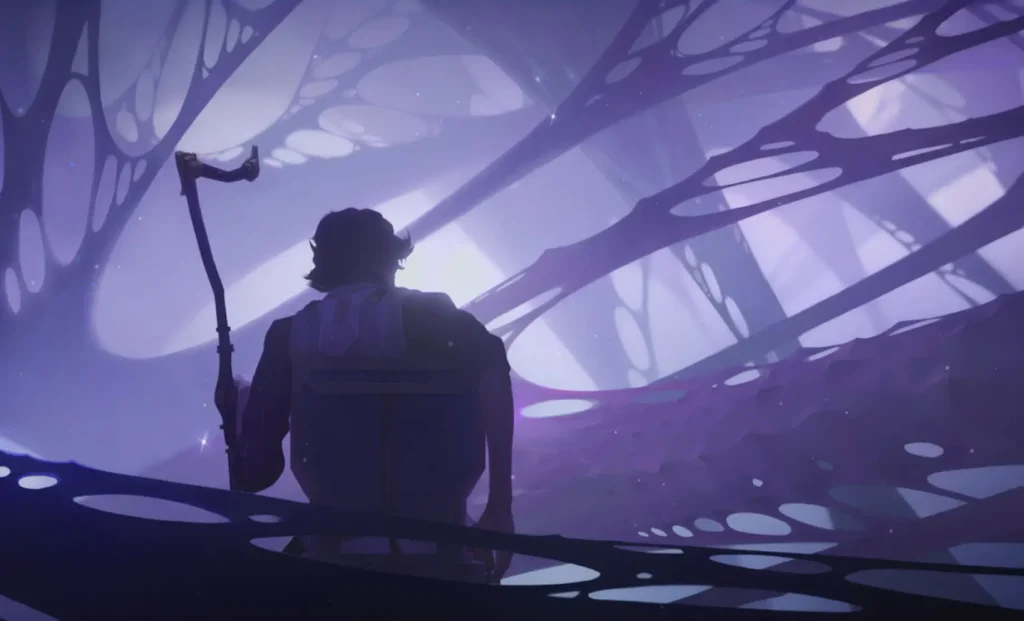
Ruel S., AI Processing Specialist |
December 23, 2024
Ethical Evolution Explored
In Netflix’s Arcane, Viktor is a Zaunite scientist working alongside Jayce to develop Hextech, a revolutionary form of magic-infused technology. Motivated by his experiences of suffering and poverty in the undercity of Zaun, Viktor dreams of creating a world where human frailty and inequality can be overcome through scientific advancement. This vision evolves into his pursuit of the “Glorious Evolution,” a radical plan to improve humanity by merging it with technology.
In the series, Viktor’s drive becomes more urgent as his terminal illness worsens. He delves deeper into the potential of the Hexcore, a self-evolving, biomechanical device promising limitless transformation. However, his experiments with the Hexcore become perilous, sparking moral conflicts and leading to devastating consequences. While his intentions are rooted in compassion and hope for progress, Viktor’s quest for glorious evolution highlights the ethical dilemmas and personal sacrifices tied to his unyielding ambition.
The ethical dilemmas Viktor faces in Arcane resonate with those in AI research, where the pursuit of innovation often requires navigating complex moral questions.

“Nobody’s ever believed in me. A poor cripple from the undercity. I was an outsider the moment I stepped foot in Piltover. I didn’t have the benefits of a patron or a name. I simply believed in myself.”
— Viktor, Arcane S1 E2
The rise of artificial intelligence (AI) has brought us into an era of innovation and opportunity that feels almost limitless. It’s scary, isn’t it? Endless possibilities—far beyond what any individual in history could achieve alone. Some even thought that AI would take over humanity, which proved to be somewhat possible if AI’s evolution were left unchecked. With all that in mind, why was AI invented in the first place?
Everything starts with a “What if?”
One realization that started everything was someone who confronted the fear of facing new heights and took the first step—perhaps driven by determination or even desperation like Viktor. That’s what I did when I joined Lexcode. In my first few weeks, I struggled to figure out what I could do and what I could offer to the table, which is somewhat aggravating to think about, especially for a fresh graduate entering the workforce. I looked for several ways to contribute to my team, taking advantage of my knowledge in the field of AI. I contributed, adapted, and transformed to meet expectations, yet the feelings of “not being enough,” “being lacking,” and “not being able to” lingered. Aside from being incapable of meeting expectations, mostly from the astronomically high standards I set for myself, I started to question and reflect:
“Will I be able to do it? I don’t know. But I can try.”
From inventing groundbreaking technologies to landing on the moon—or even something as simple as solving math problems with a few taps on a keyboard—our journey often begins with a single thought: “Will I be able to do it?” Doubt has always been my formidable enemy; it lingers in everything I do. Sometimes, the question isn’t “Can I?” but rather “Will I?” as doubt often comes with fear. Well, perhaps the better question to ask is, “When will I be able to?”
With the rapid pace of technological advancements we’ve witnessed in just a few years, it’s natural to wonder: Why was AI created? Was it because, like me, people often think that they’re incapable of doing things that they want or reaching the heights they set for themselves? Do they also feel and carry the burden of not being enough? Is it to create an entity far greater than we would ever be? Or to replicate something we could never be?
“No great science should ever put lives in danger.”
— Heimerdinger, Arcane S1 E2
AI represents one of humanity’s most transformative achievements. Born from the desire to replicate and enhance human intelligence, AI has evolved from theoretical concepts into real-world systems that drive innovations, automate processes, and tackle challenges across every industry. From automating mundane tasks to solving complex problems in fields like medicine and science, AI’s development has been fueled by a vision of making life more efficient, informed, and interconnected.
As AI systems become increasingly capable—able to analyze vast amounts of information and even predict human behavior—the challenge lies in mastering its overwhelming potential. Misuse or lack of proper control can lead to unintended consequences, such as bias, misinformation, ethical dilemmas, or, worse, as some fear, AI completely taking over humanity.
“If dangerous ideas didn’t excite the imagination, we would never wander astray.”
— Heimerdinger, Arcane S1 E2
Dangerous ideas ignite the imagination, pushing us to question norms, explore the unknown, and challenge the limits of what we believe is possible—spurring nearly every technological advancement, including AI. From scientific revolutions to technological breakthroughs, history shows that venturing into risky, uncharted territory often leads to progress. The allure of such ideas lies in their potential to transform our understanding and capabilities, even if they come with uncertainties. Without the excitement of dangerous possibilities, humanity might never have dared to explore the unknown.
However, exploring the unknown requires careful balance. The same idea that fuels progress can also lead to unintended consequences if left unchecked. Danger demands responsibility, discipline, and thoughtful reasoning.
“We’re no strangers to failure. What makes this the City of Progress is that we keep trying until we get it right.”
— Jayce, Arcane S1 E8
Building effective AI systems is a process of continuous learning, where failure is not only expected but embraced as a stepping stone toward innovation. In Arcane, this is reflected through countless timelines and possibilities. The vast amounts of data and time required to train AI systems mirror this commitment to persistence, as each iteration refines the model and pushes it closer to its intended performance.

AI development demands patience and resilience. Training a model involves processing massive datasets, running complex algorithms, and fine-tuning parameters over extended periods. This process can take weeks, months, or even years, depending on the scale and complexity of the task. Moreover, early-stage errors often reveal valuable insights, guiding researchers toward more robust and reliable solutions.
AI thrives on a mindset of relentless experimentation and improvement, where every misstep is an opportunity to learn and innovate, ultimately transforming failures into success. Every mistake is accounted for and considered an essential part of the process. Perhaps mistakes can lead us to better paths, helping us narrow down our reasons and goals. Mistakes may lead to improvement, but so can desperation.
“Surely, we, the pioneers of science, can use it for good. We’re the champions of discovery. Why fear it when we can master it?”
— Jayce, Arcane S1 E2

Harnessing the power of AI starts with understanding how to guide it effectively. Among the many skills emerging in this field, prompt engineering stands out as a critical tool for unlocking AI’s potential. By crafting precise and intentional inputs, users can direct AI systems to produce accurate, relevant, and goal-aligned outcomes.
However, prompt engineering is more than just a technical skill—it’s a discipline rooted in creativity and strategy. It allows us to shape AI’s immense capabilities, ensuring they address specific needs while upholding human values. With well-designed prompts, we can transform the overwhelming potential of AI into solutions that are focused, practical, and impactful.
In a sense, prompt engineering is how we bridge the gap between AI’s power and our goals. It empowers us to refine, control, and align this groundbreaking technology with our vision for the future. By doing so, we turn limitless possibilities into real, meaningful contributions that drive progress. Have you ever wondered, much like Viktor’s drive to eliminate human suffering through technology, what should guide progress? Should it be your ideals as a driving force or the need to be better for others? Sympathy or empathy? Emotions or understanding? You decide.
“Evolution has a destination. Not to combat nature, but to supersede it. The final, glorious evolution.”
— Viktor, Arcane S2 E6
AI represents not just a tool but an evolutionary leap, enabling capabilities that extend far beyond human physical and cognitive limits. From solving complex global challenges to augmenting creativity and decision-making, AI offers a glimpse into what the “final, glorious evolution” might look like—a symbiosis of human ingenuity and machine precision.
This future, however, raises profound questions about the role of AI in shaping humanity’s destiny. Will AI empower us to achieve unparalleled progress, or will its unchecked evolution create new risks? Superseding nature implies not only transcending its limitations but also integrating its principles into AI systems to ensure harmony, sustainability, and ethical alignment. The vision of a “glorious evolution” lies in balancing AI’s overwhelming power with humanity’s core values, enabling technology to enhance human existence rather than replace it.
“Hextech may keep us alive, Jayce, but it’s not what will save us.”
— Caitlyn, Arcane S2 E1
While advancements like AI offer incredible tools for survival and progress, they are not inherently the ultimate solution to humanity’s challenges. Technology can provide us with the means to address problems, but the essence of what truly “saves” us lies in the human capability to act without the restriction of a code, which can be literal or figurative.
AI is a catalyst—a powerful enabler of progress that amplifies our capabilities. However, it is the values and decisions we bring to its use that shape its impact. Tools can be of great help, streamline processes, and enhance efficiency, but they cannot replace the responsibility we hold for shaping our future. True salvation comes from the synergy of innovation and humanity, where technology supports but does not dictate the path forward.

With so much power in the palm of your hands, how will you choose to use it? Will you take another step for humanity or reach what’s beyond the unknown? You always have a choice.